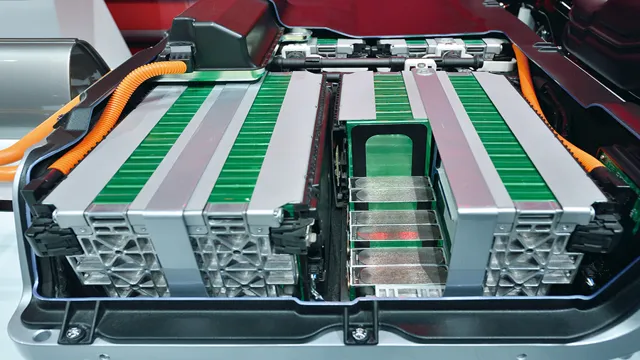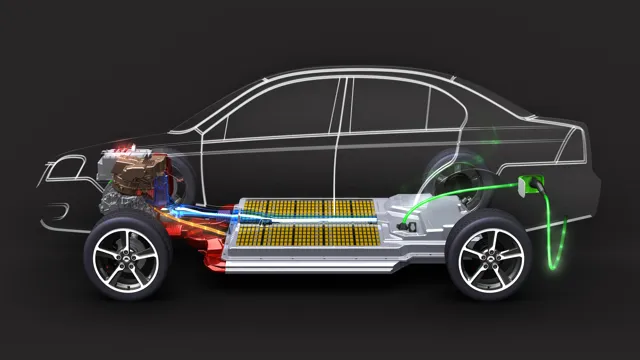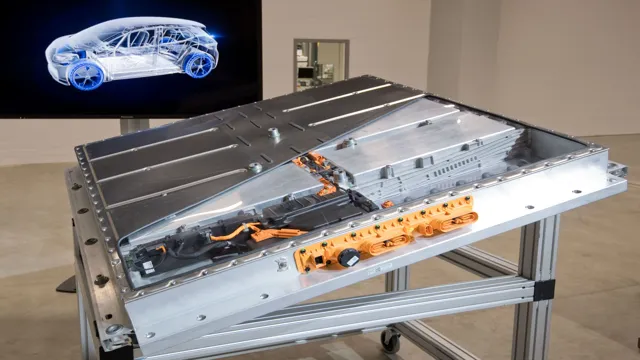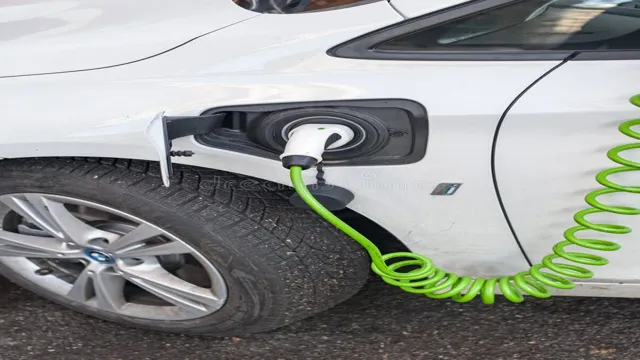Debunking the Myth: Exploring the Truth Behind Lead Acid Batteries in Electric Cars
Electric cars are gaining popularity in recent years due to their decreased environmental impact and lower operating costs. However, the batteries that power these cars raise questions about the sustainability of their production and disposal. The transition to electric cars and their batteries is driven by the technological advancements in battery storage and the need to reduce emissions.
The batteries store energy that powers the car, which is why their capacity and lifespan are so important. While electric cars seem to be the future of personal transportation, there are concerns about the sustainability and life cycle of their batteries. Fortunately, manufacturers are working on creating batteries that are more environmentally friendly and can be recycled.
As a consumer, it’s essential to weigh the benefits of electric cars against the potential environmental impact of their batteries. This is an exciting time for the automotive industry, with a shift towards electric cars and batteries that could change the future of transportation as we know it.
Types of Electric Car Batteries
While lead-acid batteries are commonly found in conventional gas-powered cars, electric cars typically rely on lithium-ion batteries instead. These batteries offer higher energy density, meaning they can store more energy in a smaller space, resulting in lighter and more efficient electric vehicles. However, there are also other types of batteries that some electric cars use, such as nickel-metal hydride and solid-state batteries.
Each type of battery has its own unique advantages and disadvantages, such as cost, durability, and safety. Ultimately, the choice of battery technology depends on factors such as the specific needs of the vehicle and the cost preferences of the manufacturer. So while lead-acid batteries may not be commonly used in electric cars, there are still many options available for efficient and reliable energy storage.
Lead-Acid Batteries and Their Characteristics
When it comes to electric car batteries, there are a few different types that manufacturers tend to use. One common type is the lead-acid battery. These batteries use a combination of lead plates and acid to create a charge and are often used in traditional gasoline-powered cars as well.
One of the advantages of lead-acid batteries is that they are widely available and relatively inexpensive compared to other types of batteries. However, they do have some drawbacks. For one, they are quite heavy, which can make them unsuitable for use in smaller electric vehicles.
Additionally, they have a relatively short lifespan compared to other types of batteries, which means they may need to be replaced more frequently. Ultimately, the choice of battery type for an electric car will depend on a number of factors, including the size of the vehicle, the desired driving range, and the cost of the battery. Regardless of the type of battery used, though, electric cars are an increasingly popular and environmentally-friendly alternative to traditional gasoline-powered vehicles.

Alternatives to Lead-Acid Batteries
Electric car batteries have evolved with alternatives to lead-acid batteries. While the latter is still the most common battery type in use, other innovative and emerging battery types are gaining traction. Lithium-ion batteries, for example, are becoming more popular due to their high energy density, low self-discharge rate, and less maintenance requirement.
Another alternative is solid-state batteries which have a higher energy density than Lithium-ion batteries and are considered to be safer due to being less prone to catching fire. There is also the flow battery technology that stores energy in two different electrolyte solutions, making it scalable and efficient. With ongoing research and development, it is possible that there will be additional breakthroughs in technology with more efficient and environmentally friendly options, reducing reliance on lead-acid batteries.
Do Electric Cars Use Lead-Acid Batteries?
While lead-acid batteries are commonly used in gasoline-powered cars, they are not typically found in electric cars. Instead, electric cars use lithium-ion batteries, which are lighter and have a higher energy density than lead-acid batteries. While lead-acid batteries can still be used in some electric cars, they are not as efficient or reliable as lithium-ion batteries.
Additionally, lead-acid batteries require more maintenance and have a shorter lifespan, making them less practical for electric cars. So, to answer the question – do electric cars have lead-acid batteries? The answer is no, not typically.
The Rise of Lithium-Ion Batteries in Electric Cars
The rise of lithium-ion batteries has played a significant role in the growth of the electric car market. While lead-acid batteries have been the traditional choice for powering cars, the superior energy density and longer lifespan of lithium-ion technology has made it the preferred option for electric cars. Lithium-ion batteries are more efficient, meaning they can store more energy in a smaller space and deliver it more quickly, making them ideal for the high-performance demands of electric cars.
Additionally, lithium-ion batteries have a longer lifespan compared to lead-acid batteries, reducing the need for replacements and minimizing their impact on the environment. So, while lead-acid batteries are still used in some electric cars, the trend is increasingly moving towards lithium-ion batteries as the preferred choice for powering the future of transportation.
Some Electric Cars Still Use Lead-Acid Batteries
Electric cars are becoming increasingly popular, and for good reason: they are eco-friendly and cost-effective. But do electric cars use lead-acid batteries? The answer is yes, some still do. Lead-acid batteries have been around for a long time and are reliable, but they are heavy and not very efficient.
However, newer electric cars are moving away from lead-acid batteries and toward lithium-ion batteries, which are much lighter and more efficient. The advantages of lithium-ion batteries are numerous: they are more durable, have a longer lifespan, and are better for the environment. So while some electric cars may still be using lead-acid batteries, the trend is moving in the direction of lithium-ion.
Overall, the shift toward greener, more efficient technology is a positive one and will continue to benefit us in the long run.
Lead-Acid Batteries in Hybrid Cars
Lead-acid batteries have been a popular choice for powering hybrid cars, but they are not commonly used in all-electric vehicles. These batteries are reliable and have been used in cars for decades, but they do come with limitations. For instance, lead-acid batteries are bulky and heavy, which can limit their use in smaller electric cars.
They also have a limited lifespan and require maintenance, making them less attractive to many car manufacturers who prefer lithium-ion batteries. That said, in hybrid cars, lead-acid batteries can be an efficient way to store and reuse energy from the gas engine, making them a reliable and cost-effective option for hybrid drivers. Overall, while lead-acid batteries are not the most advanced technology available, they still have their place in the automotive industry, especially when it comes to hybrid cars.
Advantages and Disadvantages of Lead-Acid Batteries in Electric Cars
When it comes to electric cars, lead-acid batteries are not as commonly used as they once were. However, there are still some electric vehicles that use this type of battery. One advantage of lead-acid batteries is that they are relatively inexpensive compared to other types of batteries.
They also have a long lifespan and can be easily recycled. Additionally, lead is a commonly found element, so the production of lead-acid batteries does not rely on rare materials. However, one major disadvantage of lead-acid batteries is that they are heavy and bulky, which can limit the range and overall performance of an electric car.
They also require regular maintenance, including topping off the electrolyte and ensuring proper ventilation. Overall, lead-acid batteries may be a good choice for some electric vehicles, but they do have their limitations.
Advantages of Lead-Acid Batteries
Lead-Acid Batteries Lead-acid batteries have been used in a variety of applications for over a century and are still widely used today in electric cars due to their numerous advantages. They are inexpensive, readily available, and can be recycled, making them environmentally friendly. Lead-acid batteries have a high energy density, which means they can store a large amount of energy in a compact size.
They also have a longer lifespan than other types of batteries and can withstand extreme temperatures, making them ideal for use in electric cars. However, on the downside, lead-acid batteries are heavy, which can affect the performance and handling of electric cars. Additionally, they require proper maintenance, such as regular charging and water top-up, which can be time-consuming.
Despite these drawbacks, lead-acid batteries remain a popular choice for many electric car manufacturers due to their affordability and reliability.
Disadvantages of Lead-Acid Batteries
Lead-acid batteries have been the go-to choice for electric cars for many years due to their low cost, high reliability, and ease of maintenance. However, they do come with some disadvantages that need to be considered. One major disadvantage is their weight.
Lead-acid batteries are heavy, which can reduce the range and performance of electric cars. Another downside is their limited lifespan. They typically last only a few years and require replacement, which can add to the total cost of ownership.
In addition, lead-acid batteries are not very environmentally friendly and can cause pollution if not disposed of properly. Finally, they are not very efficient and can lose power over time, particularly in extreme temperatures. Despite these drawbacks, lead-acid batteries remain a popular option for electric car manufacturers due to their low cost and reliability.
Conclusion
In conclusion, while some electric cars may still use lead acid batteries, the industry is quickly moving towards more advanced and efficient technologies. So while we may not be completely rid of lead acid just yet, the future is bright for electric vehicles with cleaner and more sustainable power sources.”
FAQs
What type of batteries do electric cars use?
Electric cars can use different types of batteries, including lithium-ion batteries, nickel-metal hydride batteries, and even lead-acid batteries depending on the model and manufacturer.
Are lead-acid batteries commonly used in electric cars?
Lead-acid batteries are less commonly used in modern electric cars because they tend to have a shorter lifespan and lower energy density compared to other battery types. However, some electric vehicle manufacturers may still use them for specific purposes, such as for auxiliary power or regenerative braking.
Can lead-acid batteries be recycled in electric cars?
Yes, lead-acid batteries used in electric cars can be recycled. This is important to reduce the environmental impact of electric vehicles and promote sustainability. Depending on the location and recycling facility, lead acid batteries can be processed to extract the lead and other valuable components for reuse in other applications.
Do electric cars with lead-acid batteries have shorter driving range?
Generally, electric cars with lead-acid batteries tend to have a shorter driving range compared to cars that use other types of batteries. This is because lead-acid batteries have lower energy density and thus, weigh more and take up more space than more advanced battery solutions like lithium-ion. As a result, cars with lead-acid batteries may need to be recharged more frequently to cover the same distance.




